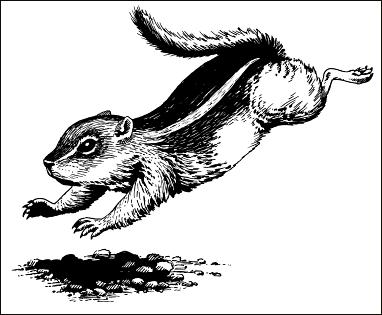

Look! A chipmunk! Sorry, but that's no chipmunk—it's a Texas Antelope Squirrel. This frisky little ground squirrel inhabits the eastern portions of the Chihuahuan Desert from southern New Mexico and the Big Bend of Texas south into southern Coahuila and eastern Durango. Dwelling primarily in rocky habitats in the creosote-bush/tarbush/lechuguilla vegetation zone, it thrives below the elevations typically inhabited by chipmunks of the region. It is, however, frequently mistaken for them. The giveaway is that these squirrels have only a single white stripe on either side of the body but no stripes on the face.
These busy rodents may stuff mesquite beans and the seeds and fruit of
many other desert plants in internal cheek pouches. Leaves and plant stems provide
nourishment in spring and early summer. Because they are abundant and easily captured,
these inoffensive rodents are an important food source in Mexico, not only to the usual
suspects, but—in some areas—even to humans.

Listen to the Audio (mp3 format) as recorded by KTEP, Public Radio for the Southwest.
Contributor: Arthur H. Harris, Laboratory for Environmental Biology, University of Texas at El Paso.
Desert Diary is a joint production of the Centennial Museum and KTEP National Public Radio at the University of Texas at El Paso.

An antelope squirrel. © 1999 Zackery Zdinak, used by permission.
Best, T. L. Texas antelope squirrel / Ammospermophilus interpres. Pp. 404-405, in The Smithsonian Book of North American Mammals (D. E. Wilson and S. Ruff, eds.). Smithsonian Institution Press, Washington, D.C., 750 pp.